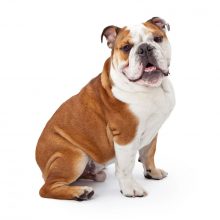Bulldog (English Bulldog)
Lifestyle Needs

The Bulldog is seen by some as the national dog. The modern Bulldog bears little resemblance to the bull-bating dog of previous centuries. Encouraged by the show ring breed standard, he has become shorter legged, wider chested and extremely short faced. His temperament varies. His exercise needs also vary depending on his ability to breathe and regulate his body temperature. It is essential to choose a Bulldog puppy from parents of a less extreme type.
Please do not buy a flat-faced dog
Genetic Diversity
(Known as Coefficient of Inbreeding: 'COI'. It should be as low as possible.)
The UK Kennel Club breed average COI is 10.0% - See 'A Beginners Guide to COI'
Gene Pool Size
(Known as Effective Population Size: 'EPS')
67.9
EPS is a measure of how many individuals are contributing genetically to a breed population. It is a measure of the size of the gene pool in a breed. Lower than 100 is considered critical by conservationists and below 50 brings a breed close to extinction. For more information see the Kennel Club article.
Health and Welfare Problems due to Conformation
(Body shape and physical characteristics)
- The conformation of many Bulldogs has extreme and causes many welfare problems
- There can be problems in mating naturally
- Dystocia due to a mismatch in size between the mother’s pelvis (too small) and the puppy’s head (too big). Many Bulldog puppies are born by caesarean section.
- Excessive wrinkling of the facial skin can lead to infection if not cleaned regularly.
- His jaw structure gives the Bulldog abnormal teeth.
- Brachycephalic obstructive airway syndrome (BOAS): his extremely short nose and narrow nostrils lead to breathing problems, panting, chronic discomfort, exercise intolerance and difficulty eating.
- Sensitivity to heat due ro pinched nasal passages and abnormally narrow trachea.
- Brachycephalic ocular syndrome linked to shortenend nose and head shape.
- Hemivertebrae – associated with selection for curly tail.
- The curly tail makes it difficult to signal to other dogs
Note that efforts are now being made by the Bulldog Breed Council to breed away from these extremes.
BVA/KC Health Schemes: www.bva.co.uk/chs
- Hip dysplasia: breed 5 year mean score 43.6 (severe) parents should be much lower.
- Elbow dysplasia: ideally O:O
- The Bulldog is one of the 15 high profile breeds designated by the Kennel Club as requiring particular monitoring by reason of visible conditions which may cause health and welfare problems.
- Eye testing in brachycephalic dogs should be routine as a foreshortened head/face can cause substantial welfare problems throughout a dog’s life.
Estimated Breeding Values (EBVs) : No EBVs are currently available for this breed
www.thekennelclub.org.uk/about-ebvs
DNA Tests Available
DogWellNet and IPFD Harmonisation of Genetic Testing for Dogs (HGTD)
www.dogwellnet.com/breeds
- Hyperuricosuria (HUU) (Urolithiasis)
Availability of a DNA test does not mean that it is always necessary or even desirable for breeders to use this test.
Other Breed-Specific Health Screening Schemes
- Breed Council certificate for breeding – bronze, silver, gold
- The Kennel Club and University of Cambridge Respiratory Function Grading Scheme:
www.thekennelclub.org.uk/rfg-scheme Breeders must use this Scheme and the accompanying breeding advice to reduce the chances of puppies developing respiratory difficulties as a result of their brachycephalic conformation. - Patella test
- Hemivertebrae x-ray screening
- Heart testing
Ask the breeder to show you the certificates for the above tests/screening for both parents. If any of the above tests have not been considered necessary by the breeder (and there may be good reasons), ask her to explain why.
Other Diseases Reported
(For which there are currently no genetic or screening tests for sire or dam)
- Atopy
- Demodicosis
- Heart disease: Pulmonary stenosis
- Cranial cruciate ligament disease
- Swimmer puppy syndrome
- Distichiasis
- Deafness
- Cherry eye, Corneal ulceration and other eye diseases
- Cancer: various types in old age
- Dystocia
Ask the breeder about the medical history of the parents, grandparents and great grandparents. Consider carefully whether to purchase a puppy if some of these or other diseases are in the family line.
Ask about the breeder’s policy in cases of serious genetic diseases occurring to your puppy in later life. Good breeders will request to be informed of such events in order to improve future breeding decisions.
You are strongly advised to buy from a breeder who uses (or is prepared to use) the AWF Puppy Contract and Puppy Information Pack (PIP): www.puppycontract.org.uk
The breeder should also be familiar with the CFSG/DBRG Code of Practice for Dog Breeding